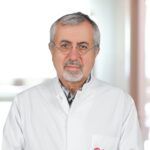Doctors for treatment of Parkinson's disease
Doctors for the treatment of parkinson's disease
Frequently Asked Questions
This is a damage to the nerve cells of the substantia nigra of the brain. They are responsible for the production of dopamine, and therefore there is a lack of it in people with this problem.
The reasons for the development of this disease are not clear, but risk factors have been studied:
- cases of illness in relatives;
- toxic effects of the environment (for example, heavy metal poisoning).
The first signs of this problem are changes in handwriting and loss of scent.
The main symptoms are:
- slow motion,
- stiffness,
- tremors at rest, convulsions,
- change in posture,
- changes in blood pressure and body temperature.
There are 5 stages:
- No deterioration in quality of life.
- Problems with walking and speech defects.
- Instability even when standing.
- A person cannot serve himself.
- Movement only in a wheelchair.
Correct treatment helps to maintain life expectancy even with an early onset of this pathology.
Since destroyed neurons cannot be restored, this disease cannot be completely cured. But with the right treatment, you can stop the progression of symptoms and restore the patient’s ability to walk and care for themselves, reduce tremors and improve fine motor skills in the hands.
To make a diagnosis, you need:
- consultation with a neurologist;
- assessment of symptoms after taking antiparkinsonian medicines (L-dopa test);
- images of the nervous system on different devices: DaTSCAN, IBZM-SPECT, MIBG scintigraphy, MRI, CT.
Treatment begins with antiparkinsonian medications. The first line is usually light drugs. Their dose has to be increased over time until they switch to stronger last-line drugs such as levodopa. With the rapid progression of the disease and drug resistance, neurosurgery is used.
International Standards for the Diagnosis and Treatment of Parkinson’s
The diagnosis is based on the patient’s medical history and examination by a doctor. To make a diagnosis, images are taken: cranial computed tomography (CKT), magnetic resonance imaging (MRI), or scintigraphic images of nerve cells (PET, SPECT).
New methods for diagnosing Parkinson’s disease
DAT-SPECT and IBZM-SPECT measure the level of dopamine deficiency. This substance plays a central role in the development of this disease. DAT-SPECT is the most accurate method: 97% correctness of the diagnosis.
Laboratory tests
The severity of symptoms is assessed using the standardized L-dopa test. Symptoms are assessed before and after taking a certain amount of levodopa. The degree of movement disorder is assessed using a similar method: the apomorphine test. Another approach is to search for specific blood biomarkers: the alpha-synuclein protein.
If you suspect you or a relative has Parkinson’s disease, you should see a neurologist specializing in Parkinson’s disease. You will find qualified professionals on the MedTour platform. Compare their work experience and accomplishments and choose the right doctor.
Surgery
If the medication fails, the patient is recommended deep brain stimulation. This is the implantation of electrodes in specific areas of the brain. The pulses stimulate the release of dopamine, and the pulse generator is placed under the skin in the clavicle area. 95% of patients were satisfied with the result of the operation and recommend it to others.
Non-traumatic operation with MRgFUS ultrasonic scalpel
During this operation, focused ultrasound heats up areas of the brain that inhibit dopamine production. The advantage is painlessness, quick effect, absence of radiation exposure and the risks associated with anesthesia, because the procedure is carried out in consciousness.
There are also disadvantages:
● expensive cost of the procedure, comparable to the cost of deep stimulation
● only suitable for patients with unilateral tremor
● after 5-10 years, the effect of the procedure gradually decreases, which may lead to the need for deep brain stimulation.
Treatment with cell preparations
Neural crest stems are capable of transforming into cells of the nervous system and neuroglia. They are extracted from hair follicles on the neck, filtered in the laboratory, propagated on special nutrient media and then injected into the affected area using neuronavigation. The method resembles a conventional biopsy or deep brain stimulation.
This triggers the reproduction of nerve cells affected by Parkinson’s disease. This increases dopamine levels and reduces symptoms.
What determines the success of treatment
The last stages of the disease reduce life expectancy and its quality, therefore it is important:
● experienced doctors and timely diagnosis;
● correct drug regimen;
● timely neurosurgery or MR-fus;
● comprehensive psychological and social support, rehabilitation.
How to choose a hospital for treatment
● availability of special equipment: PET / CT Gemini TF64-Philips;
● specialists with experience in managing such patients (therapists, neurologists, neurosurgeons, nurses, physiotherapists and speech therapists);
● use of evidence-based medicine protocols and the results of randomized trials;
● own laboratory of radiopharmaceuticals with quality control;
● state registration of the latest antiparkinsonian drugs.







